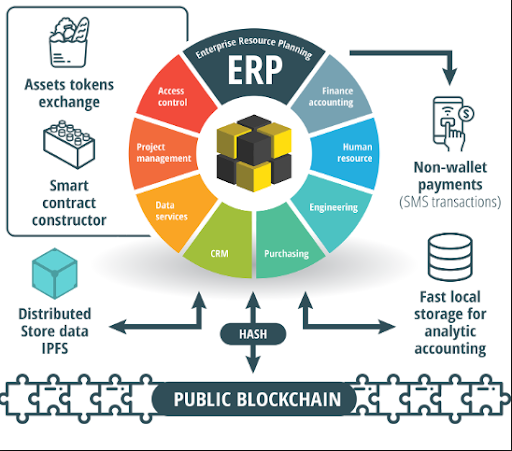Integration of Blockchain Technology in ERP System
Posted By : Pawan Sunar | 29-Feb-2020
blockchain ERP

Why Integrate ERP Systems to a Blockchain?
Enterprise Resource Planning system centralizes all business data, allowing businesses to realize fuller control of internal operations and make informed decisions for the longer term. Additionally, all data is updated in real-time, which is crucial for the seamless functioning of all business sectors. It helps to eliminate the prospect of dangerous errors. At the same time, instant access makes it possible to identify potential setbacks when there is continuous communication between the departments. Blockchain technology, on the other hand, is a compiling option to keep records of data. Blockchain consists of a list of an immutable record of data that acts as a decentralized ledger shared by a cluster of computers or “nodes” which securely registers transactions in “blocks” of data.
The capabilities of blockchain is to store immutable blocks of data that will be secure, transparent, and reliable source to register relevant information of a business. These records may include organizational structure, invoices, supply chain traceability, and accounting journal entries. ERP software helps in organizing the varied departments of an enterprise like sales, manufacture, and accounting. In contrast, Blockchain technology makes a transparent public ledger system through which compiling data of sales and other digital information are often handled securable and comfortable.
Integrating Blockchain into ERP decentralizes the whole digital information of the enterprise. Thus the whole work process and its information will be more secure & safe, and allows independent verification along with third-party verification. Moreover, since Blockchain is a distributed ledger type, it provides more transparency in transaction histories among the participants within the network. Thus data provided is more accurate and consistent. Blockchain is employed to secure and distribute data in a new and unique way. A blockchain may be a list of encrypted blocks that are continuously growing. In each block, there's typically a cryptographic regard to the previous block, a time stamp and variety of transactions.
Blockchain technology accounts for a lot to supply to ERP systems and therefore, the overall digital environment of a corporation.
Following are some of the attributes blockchain might supply to an ERP:
- Blockchain adds transparency and auditability to an organization’s records:
One of the benefits of blockchain is the ability to make smart contracts. Smart contracts are computer protocols which add transparency and immutability to transactions, verify and enforce contracts automatically using digital codes without the necessity of third parties. Also, blockchain can transform supply chain management by adding trust and transparency to the method. Supply chain involves people that need to trust each other. Blockchain technology can solve trust issues between companies.
- Increases the safety of knowledge records:
Blockchain can validate transactions and make an immutable record of knowledge that's shared among various nodes. This suggests that if someone changes anything within the registry or any contract, it'll appear and be traceable.This is often particularly relevant when managing ERP systems since broken records may end in audit or accounting issues. Also, blockchain is often used for verification and authentication of identities. By authenticating personnel, the corporation may increase security by managing who has access to sensitive information. Blockchain-based authentication systems use digital signatures supported public-key cryptography and an automatic check of the right private key, meaning that whoever has access to the private key is the owner. Moreover, by integrating ERP Software systems with blockchain, it would be possible to stop data leakage, detect suspicious attempts of unauthorized access and other security threats in real-time. This technology offers encryption, validation, and decentralization. It is virtually not possible to hack since the records aren't contained in a central location, which could reveal some extent of failure.
- Offers optimization and speed to the organization’s processes:
Once blockchain is integrated into an organization’s ERP system, it enables the optimization of its operations, internal data control, and business processes like intercompany transactions. For example, smart contracts can help automatically verify a transaction between companies when it complies with the wants of the contract.
When integrating blockchain in ERP development services, this could ideally be through with minimal disruption to the regular business processes and avoid adding steps to the people responsible.
- Blockchain boosts visibility and traceability to the system:
Blockchain gives the power to companies to possess various sorts of information within an equivalent chain, which also grants quick access to relevant stakeholders to highly specific information. For instance, manufacturing requires many stakeholders involved within the supply chain process to simply monitor the journey of products until delivered to clients.
At Oodles we provide a blockchain integration which offers real-time traceability of the products.








